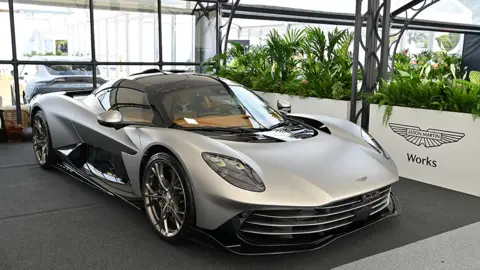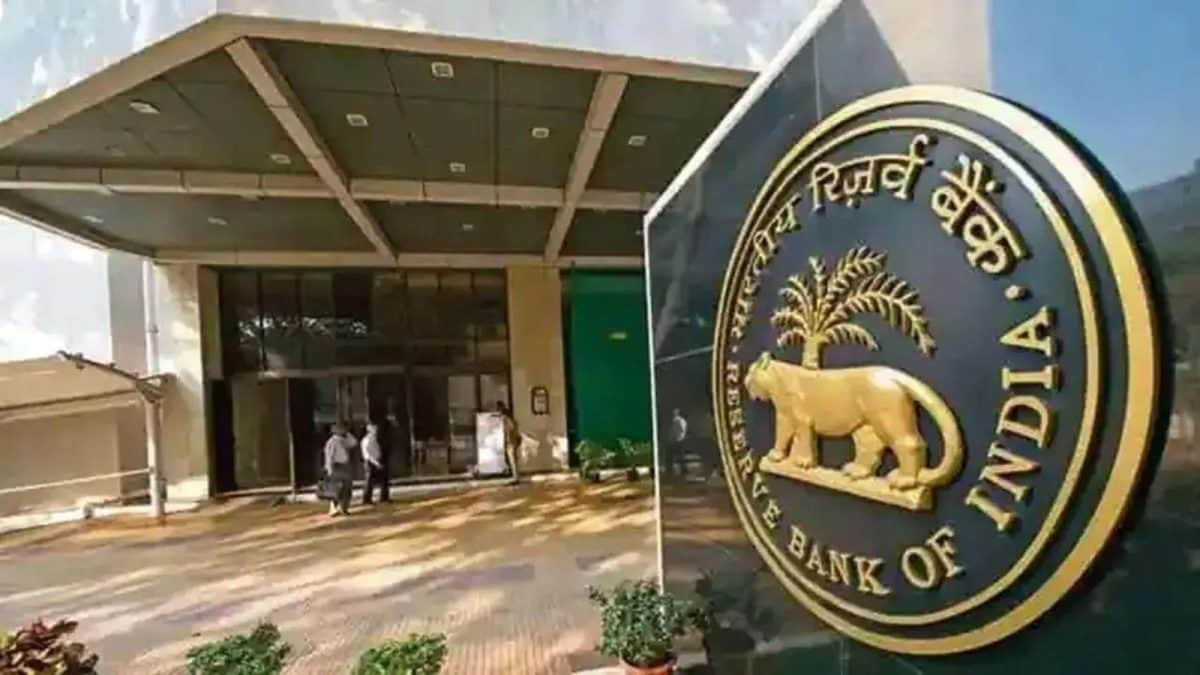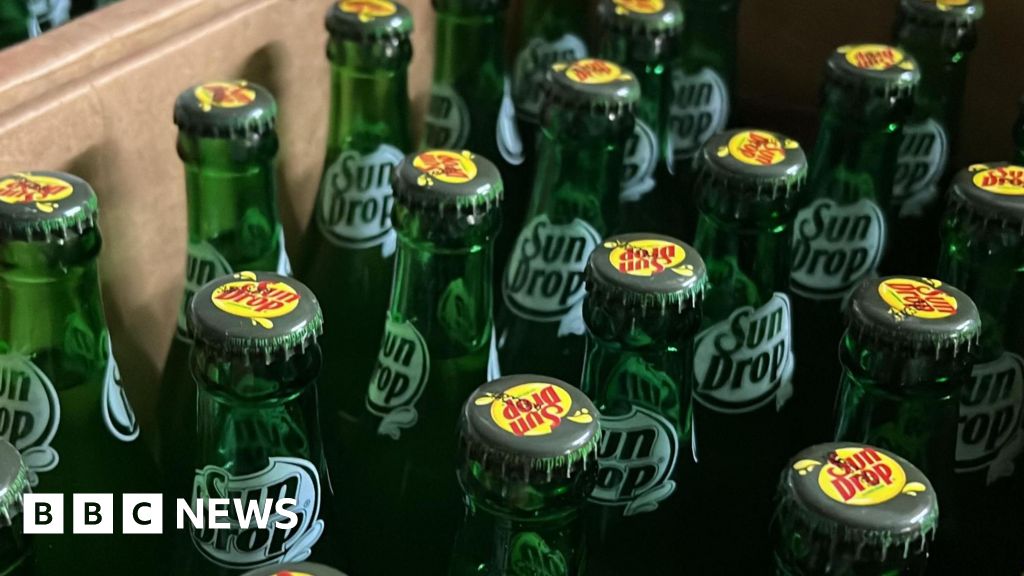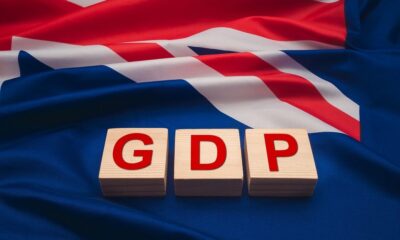Business
Aston Martin in profit warning amid US tariff woes

 Getty Images
Getty ImagesAston Martin Lagonda has warned of further losses as it faces US tariffs, and also raised fears over supply chain pressures from Jaguar Land Rover’s cyber-attack fallout.
The Warwickshire luxury carmaker said it was now braced for underlying losses greater than £110m, which was the bottom of the previous expected range.
The announcement marks the second downgrade to its outlook since early July.
Aston Martin bosses said they had launched an “immediate” review of costs and spending in light of tougher trading.
It sent shares tumbling by as much as 11% at one point during trading on Monday.
The firm said wholesale volumes were set to drop by a mid-high single-digit percentage due to “heightened challenges in the global macroeconomic environment, including the ongoing impact of tariffs” – with a weaker performance being seen across North America and Asia.
 Getty Images
Getty ImagesIn a statement on Monday, the firm said: “The global macroeconomic environment facing the industry remains challenging.
“This includes uncertainties over the economic impact from US tariffs and the implementation of the quota mechanism, changes to China’s ultra-luxury car taxes and the increased potential for supply chain pressures, particularly following the recent cyber incident at a major UK automotive manufacturer.”
Tariff quotas
The group has seen shares come under pressure this year over concerns about the impact of Donald Trump’s tariff war.
The firm limited shipments to the US in the second quarter after the president imposed a 25% tariff on car imports in April.
It then resumed shipments in June as the UK reached an agreement with the US for a lower 10% tariff on UK-made cars for the first 100,000 vehicles per manufacturer.
Anything above that threshold will be hit with a 27.5% duty.
But Aston Martin said the tariffs were still having an impact on performance.
It said: “For UK automotive manufacturers, the introduction of a US tariff quota mechanism adds a further degree of complexity and limits the group’s ability to accurately forecast for this financial year end and, potentially, quarterly from 2026 onwards.
“The group continues to engage with both the US and UK governments to secure greater clarity and certainty.”
Aston Martin said while “positive dialogue” had been achieved with the US government directly, the firm was still seeking proactive support from the UK.
It hopes that profitability and free cash flow will “materially” improve in 2025-26 as it cuts costs and ramps up delayed production of its Valhalla model – the group’s first plug-in hybrid mid-engine supercar.
In February, before tariffs were announced, Aston Martin cut 170 jobs after seeing losses widen by a fifth last year and debts pile up.
Its results for the first half of 2025 showed core profitability (EBIT) slumped to £121m, compared with £99.8m in the same period of 2024.
Business
Yes Bank Under Scanner As RBI Summons Executives Over Forex Card Breach

Last Updated:
RBI has summoned senior officials of Yes Bank following a major data breach involving the Yes Bank–BookMyForex multi-currency forex card


Reserve Bank of India headquarters in Mumbai.
The Reserve Bank of India (RBI) has summoned senior officials of Yes Bank following a major data breach involving the Yes Bank–BookMyForex multi-currency forex card, two people aware of the development told The Economic Times (ET).
According to the report, card details and CVV numbers of several users were allegedly compromised. The central bank has sought a detailed explanation from the bank on how its systems may have been breached and the sequence of events that led to the exposure of sensitive customer data.
“The RBI has sought a comprehensive briefing from Yes Bank’s senior management on the root cause of the breach, the timeline of events, and the adequacy of the bank’s cybersecurity framework,” one of the persons cited by ET said. “The regulator wants clarity on how sensitive card data, including CVV numbers, may have been exposed and what immediate containment measures have been implemented.”
Yes Bank declined to comment on the RBI’s queries but said an internal investigation had identified fraudulent transactions involving 15 merchants in a Latin American country on February 24. Transactions worth Rs 2.54 crore were approved across 5,000 customers, while 688 unauthorised attempts amounting to around Rs 90 lakh were blocked. The bank said it is working with the card network to initiate chargebacks and ensure that affected customers do not face financial losses.
Separately, BookMyForex said it does not store customers’ sensitive card information and that its systems were neither breached nor compromised during the period in question.
The RBI has also sought details on how sensitive card data—particularly CVVs—was stored and protected, whether encryption and prescribed security protocols were followed, and why existing cyber controls failed to prevent the breach. In addition, the regulator is reviewing the timeline of detection and reporting, the robustness of third-party risk management and oversight, the number of customers impacted, and the steps taken to block cards, prevent misuse and mitigate losses. It has also asked for clarity on internal accountability, supervisory lapses and remedial measures to prevent a recurrence, ET reported.
Follow News18 on Google. Join the fun, play games on News18. Stay updated with all the latest business news, including market trends, stock updates, tax, IPO, banking finance, real estate, savings and investments. To Get in-depth analysis, expert opinions, and real-time updates. Also Download the News18 App to stay updated.
February 26, 2026, 07:53 IST
Read More
Business
The family-owned soda firm that stuck to returnable glass bottles

Soft drinks company Twig’s Beverage has a loyal following for its old-fashioned approach.
Source link
Business
Cost of living: Students praise ‘essential’ food bank service

Queen’s University Belfast says there were more than 10,500 visits by students to its food bank in the students’ union.
Source link
-

 Entertainment1 week ago
Entertainment1 week agoQueen Camilla reveals her sister’s connection to Princess Diana
-

 Tech1 week ago
Tech1 week agoRakuten Mobile proposal selected for Jaxa space strategy | Computer Weekly
-

 Politics1 week ago
Politics1 week agoRamadan moon sighted in Saudi Arabia, other Gulf countries
-

 Entertainment1 week ago
Entertainment1 week agoRobert Duvall, known for his roles in "The Godfather" and "Apocalypse Now," dies at 95
-

 Business1 week ago
Business1 week agoTax Saving FD: This Simple Investment Can Help You Earn And Save More
-

 Politics1 week ago
Politics1 week agoTarique Rahman Takes Oath as Bangladesh’s Prime Minister Following Decisive BNP Triumph
-

 Fashion1 week ago
Fashion1 week agoAustralia’s GDP projected to grow 2.1% in 2026: IMF
-

 Tech1 week ago
Tech1 week agoBusinesses may be caught by government proposals to restrict VPN use | Computer Weekly






